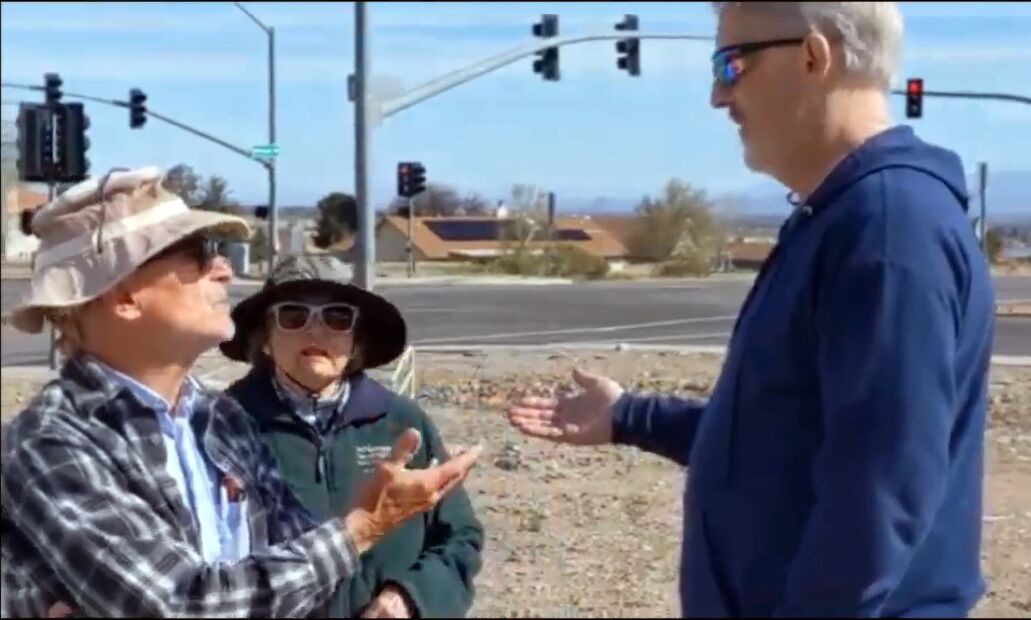The Cochise County Recorder, David Stevens, stopped his car near the post office in Hereford Friday and told a septuagenarian couple they couldn’t collect signatures there.
The tense confrontation wasn’t the angriest we’ve seen in Arizona’s tempestuous politics lately.
But it was meaningful, a culmination of important events in a county that has become a bellwether for efforts to overturn the way Arizona carries out elections. And in my opinion, it shouldn’t have happened, like a lot of things to do with elections in Cochise County lately.
Cochise County Recorder David Stevens, recently named interim elections director as well, told two people gathering signatures to recall Supervisor Tom Crosby that they couldn't do so at this site. Stevens and Crosby have been aligned on speculative efforts to change how elections are carried out.
Stevens, you may know, is former legislator who has served as county recorder since 2016. He has also aligned himself with the two-member GOP majority of the board of supervisors responsible for such speculative election policies as:
- attempting a 100-percent hand recount of the 2022 election, despite warnings it was illegal
- contesting the accreditation of the tabulation machines used in the election after it was over
- declining to certify the election until after the deadline, a likely violation of state law
The pursuit of these policies led those two supervisors, Peggy Judd and Tom Crosby, to sue the county’s then-election director Lisa Marra in November, which eventually caused her resignation in January over what she called “intolerable” working conditions. They also prompted a recall campaign against Crosby.
With the election-director job being open, and a sales-tax election coming up in May, the county needed an elections director. So those two also went ahead and appointed Stevens interim elections director for the county, in late February. This gave rise to another lawsuit, by the Arizona Attorney General’s Office, trying to block Stevens’ new appointment.
It was under those new auspices, as interim elections director, that Stevens stopped by the post office in Hereford Friday. He said he was responding to a complaint about the two volunteers, who were gathering signatures for the effort to recall Crosby from office.
“Someone called in with a complaint about them collecting signatures on federal property,” Stevens told me Monday. “Then I got a follow-up email referencing US Code.”
“I’m driving to work, I see them, and I stopped to talk to them, because I’ve already done the research,” he added. “We show the property being all to the postal service.”
As recorder, Stevens has ready access to documents recorded about real estate. And when he met the couple, he told them they weren’t supposed to be on federal property.
But of course, these people had not just carelessly stationed themselves near the post office. The recall campaign had checked with the postmaster, who told them that they could not be on the Post Office property, but that they could be on the adjacent property, said Eric Suchodolski, the chairman of the recall campaign.
So the pair thought they had the right to be there, and they weren’t too happy about a Crosby-aligned officeholder trying to stop them from collecting signatures to recall Crosby.
“Why are you here?” the man asked Stevens.
“I’m the elections director,” he said. “I handle campaign complaints.”
But of course, it is not the county elections director’s job to enforce federal law or policy about where petition-gathering can occur. That’s up to the federal government and its local officials.
“That’s outside his job description,” said supervisor Ann English, the lone Democrat on the three-member board, who voted against Stevens’ appointment as interim elections director. “He’s not an investigator.”
Stevens relented for a time, and the couple stayed on site. It turned out that despite Stevens’ earlier research, the property did not belong to the federal government, but rather a limited liability company. Later in the day, Stevens reached the owner of the company and got a letter from the owner asking that political activity not take place on his property.
Suffice it to say this is not how these things are supposed to work. It looks especially bad when the official looking for reasons to expel signature-collectors from a property is also politically aligned with the officeholder they’re trying to recall.
Stevens doesn’t see it that way though. When I asked him about his political relationship with Crosby, he said, “”We’re both he same party, but my role is to enforce the law. I would have done that regardless of who it was.”
Maybe so — and Stevens is trying to hire his permanent replacement as elections director right now. But Stevens is part of a broader group of Republican officials trying to overturn the way elections are carried out in Arizona in response to claims of fraud by former Pres. Trump and all the conspiracy theories in Arizona that have rippled out from that claim.
He’s an ally of former state representative and secretary of state candidate Mark Finchem, who has claimed for years that elections are rigged when Republicans lose. Stevens even serves on the board of an election-oriented group that Finchem founded. While Finchem tends to be hostile to anybody not an ally, though, Stevens tends toward affability.
That Stevens is friendly — a great quality — should not, of course, serve as any reassurance that he won’t step out of line given his expansive roles.
The episode Friday was small but served as a reminder of the bigger dangers posed to the political process when people convinced of conspiracies, like Cochise County’s two-person board majority, take control of elections.
And we're back to the 60s.





